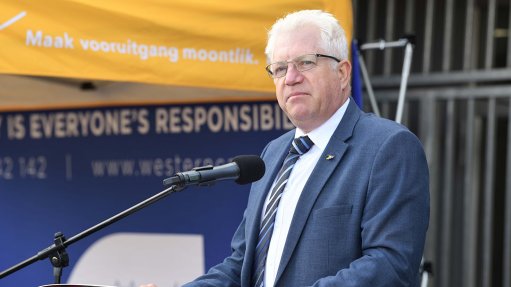
Western Cape Premier Alan Winde
Western Cape Premier Alan Winde has reaffirmed his administration’s determination to rapidly reduce, and ultimately end, the impact of electricity loadshedding (scheduled rotating power cuts, imposed by national electricity utility Eskom) on the province. He did so in his keynote address at the ground-breaking ceremony for a solar power plant at the Rheinmetall Denel Munition (RDM) facility in Somerset West (in south-west Cape Town).
“We really aim to become independent when it comes to energy provision,” he assured. “We want four or five towns this year to be loadshedding free.”
The Western Cape uses some 4 000 MW of electricity. With the aim of freeing the province’s towns from loadshedding, the province wants more than 5 000 MW of generating capacity. That will need investment. And that investment has to come from the private sector, and it has to be attracted to the province and the country.
“It is critical to enable the private sector” to generate electricity, he said, and praised RDM (part of the Germany-based Rheinmetall group) for its initiative to build a solar energy plant for its Somerset West factory, describing the defence company as a “key partner”.
Winde also emphasised the socially-adverse impact of loadshedding, the pressures it put on ordinary families, such as disrupting cooking and making it difficult for children to study for their exams during evenings. He also noted its effect on small and medium-sized enterprises and other businesses.
He highlighted the province’s initiative to create and roll out “emergency [power] packs” to help the poorest families deal with loadshedding.
But he also emphasised the need for the province to transition to renewable energy as fast as possible. This is because of the need to cut carbon emissions, which is a global trend, especially in major South African export destination countries. The Western Cape accounts for more than 50% of the country’s agricultural exports. “Those markets are not going to buy from us if we haven’t made that [energy] transition,” he warned.